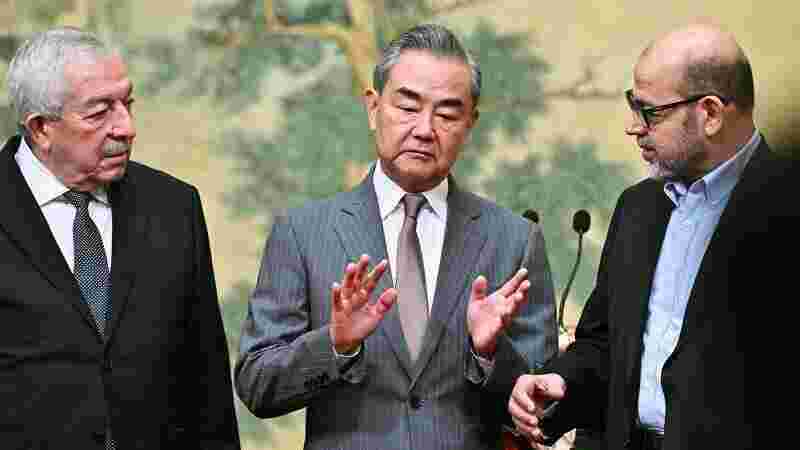In Beijing, China, Palestinian factions, including the rival groups Hamas and Fatah, signed an agreement titled "Ending Division and Strengthening Palestinian Unity," according to an announcement by China's Foreign Ministry on Tuesday. The agreement was reached during reconciliation talks hosted by China and attended by 14 Palestinian factions, amid the ongoing conflict between Israel and Hamas in Gaza.
Chinese Foreign Minister Wang Yi described the agreement as a dedication to reconciliation and unity among the factions, emphasizing that the Palestine Liberation Organization (PLO) is recognized as the sole legitimate representative of the Palestinian people. Wang also mentioned that the agreement addresses post-Gaza war governance and the formation of a provisional national reconciliation government. However, the role of Hamas, which is not part of the PLO, in this arrangement remains unclear.
The talks occurred against the backdrop of uncertainty surrounding the future governance of Palestinian territories, as Israel has repeatedly vowed to eradicate Hamas following the latter's October 7 terrorist attack. The PLO, a coalition that signed a peace treaty with Israel in 1993, formed the Palestinian Authority (PA), with Fatah as its dominant force. Hamas, on the other hand, was not a party to the accords and does not recognize Israel.
The Beijing talks included the participation of Mustafa Barghouti, president of the Palestinian National Initiative, who stated that all parties agreed to join the PLO and acknowledged it as the sole legitimate representative. Hamas and Fatah have a history of enmity and have unsuccessfully attempted to unite the two separate Palestinian territories under a single governance structure, with a 2017 agreement collapsing amid violence.
Barghouti described the latest reconciliation effort as going beyond previous attempts, with specific steps toward forming a consensus government. He attributed the impetus for unity to the war in Gaza, arguing that Israel's actions threatened everyone, fostering a sense of unity among the factions. A new government, he added, would ensure the unity of the occupied West Bank and Gaza, effectively challenging Israel's occupation.
However, Tahani Mustafa, a senior Palestine analyst, cautioned that major obstacles to reconciliation, such as Palestinian Authority President Mahmoud Abbas's reluctance to relinquish power, remain unaddressed. She also noted that Hamas seeks fair representation within the PLO, which Abbas has resisted to maintain Fatah's dominance.
At a news conference in Beijing, Mousa Abu Marzook, representing the Hamas delegation, stated that they had agreed to complete a course of reconciliation. He also defended Hamas's October 7 attack on Israel, stating that it marked a historic junction in the Palestinian struggle.
China, which has been seeking to enhance its influence in the Middle East, hosted an earlier round of talks between Hamas and Fatah in April. Since the start of the Gaza conflict, China has positioned itself as a leading voice for countries criticizing Israel's actions and calling for Palestinian statehood.
Tuesday's agreement was reached as Israeli Prime Minister Benjamin Netanyahu visited the US for meetings with top officials and a speech to Congress. The Israeli military operations in Gaza followed Hamas's October 7 attack, resulting in a mass humanitarian crisis and widespread destruction, with thousands of Palestinian deaths.
Hamas and Fatah sign agreement in Beijing ‘ending’ their division, China says
Palestinian factions including rivals Hamas and Fatah have signed an agreement on “ending division and strengthening Palestinian unity” in Beijing, China said Tuesday.


